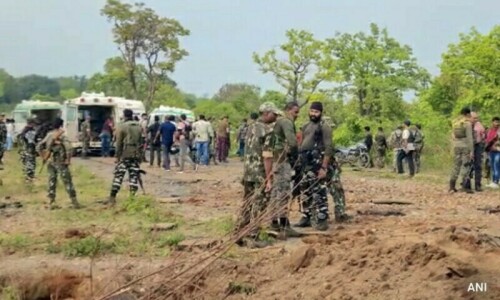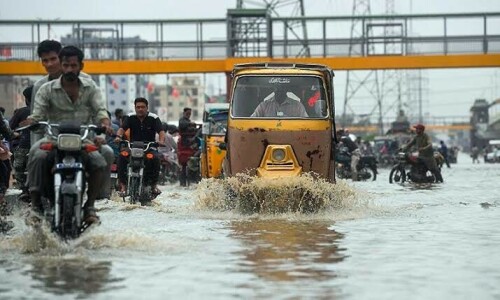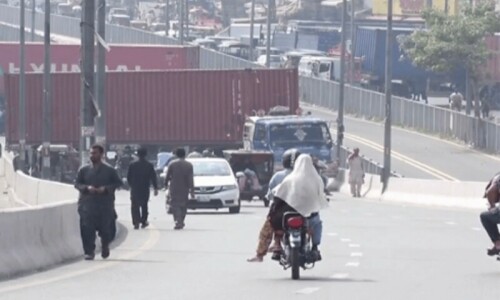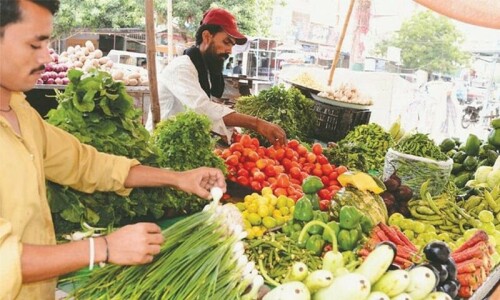 JOHANNESBURG: When three rotting crocodile carcasses were spotted in a remote corner of South Africa’s world-famous Kruger National Park wildlife reserve, alarm bells started ringing for scientists.
JOHANNESBURG: When three rotting crocodile carcasses were spotted in a remote corner of South Africa’s world-famous Kruger National Park wildlife reserve, alarm bells started ringing for scientists.
A quickly organised autopsy, and an aerial survey, confirmed their worst fears.
The giant reptiles were victims of a killer condition that had hardened their body fat to a rubber-like state, leaving them unable to move and defenceless against exposure, hunger, drowning or being eaten alive.
Since the first cases were found last May, some 170 crocodiles have been found dead and the actual death toll could be double that figure.
But a team of experts are still baffled by what triggered the deaths.
“It’s almost incredible that we’re struggling so much – there’s nothing, unfortunately, that’s jumping out at us,” said Danie Pienaar, head of scientific services at Kruger.
Although the exact catalyst is proving elusive, the experts say the deaths are a telling sign of heavily strained water resources that flow into the park, which is home to Africa’s big five: lions, leopards, elephants, buffalos and rhinos.
“We don’t have a clear idea but the general agreement among all the researchers is that it’s probably the whole system that has deteriorated over time and been pushed to the brink,” said Pienaar.
“There’s no problem that crocodiles are going to die out,” he added, “but it is just a very clear signal that there is something severely wrong in our river systems. And that we cannot really afford to ignore this any more.”
Kruger is South Africa’s flagship wildlife park, drawing 1.3 million tourists a year and covering a landmass roughly half the size of the Netherlands.
With the 110-year-old park home to some 850 non-plant species, it was feared that the infections could spread.
Known as pansteatitis or “yellow fat disease,” the condition is associated with eating rancid fish and has been found in commercial crocodile farms, domestic cats, birds and fresh-water turtles. It is not known to affect humans.
The condition attacks fat stores, depleting anti-oxidants and inflaming the fat in a process that scientists believe is very painful.
“There was a big concern that other species could be affected,” Jan Myburgh, veterinarian specialising in toxicology, told AFP.
The chief worry was for lions – seen feeding on the dead crocodiles – and other cat species, based on the susceptibility of domestic cats, but no dead or sick felines have been found, he said.
The Nile crocodiles, which average five metres in length and 225 kilos in weight, are indiscriminate eaters and well-known cannibals.
To prevent further infections, park officials burnt the recovered carcasses and shot two hippopotamuses to provide easily accessible food.
“Crocodiles are opportunists, they are going to try to eat any available food source – I saw a couple of big crocodiles swimming with smaller crocs in their mouths,” said Pienaar.
“You don’t want to get to a stage where crocodiles start dying because that is the top of the food chain predator. By the time they get affected, the whole food chain below them is probably affected,” he added.
While dead crocodiles are no longer being found, the experts are still probing the deaths, which were not accompanied by mass fish kills as seen in an earlier flare-up outside park borders but farther along the same river.
The Kruger deaths occurred in a remote gorge which has faced increased siltation from a dam in neighbouring Mozambique, and is fed by one of South Africa’s hardest-working rivers which supports various heavy industries.
Clues are now being sought by a multi-pronged programme looking at the entire river system to get a better understanding of the cause and effect links around the deaths.
Scientists will also attempt to reproduce the disease in a controlled experiment from mid-January to understand more about how it develops in crocodiles.
Meanwhile, the park and the experts are prepared for any further outbreak.
“Everybody is on the lookout – if one crocodile dies, we’ll know about it immediately,” said Myburgh.—AFP














































Dear visitor, the comments section is undergoing an overhaul and will return soon.